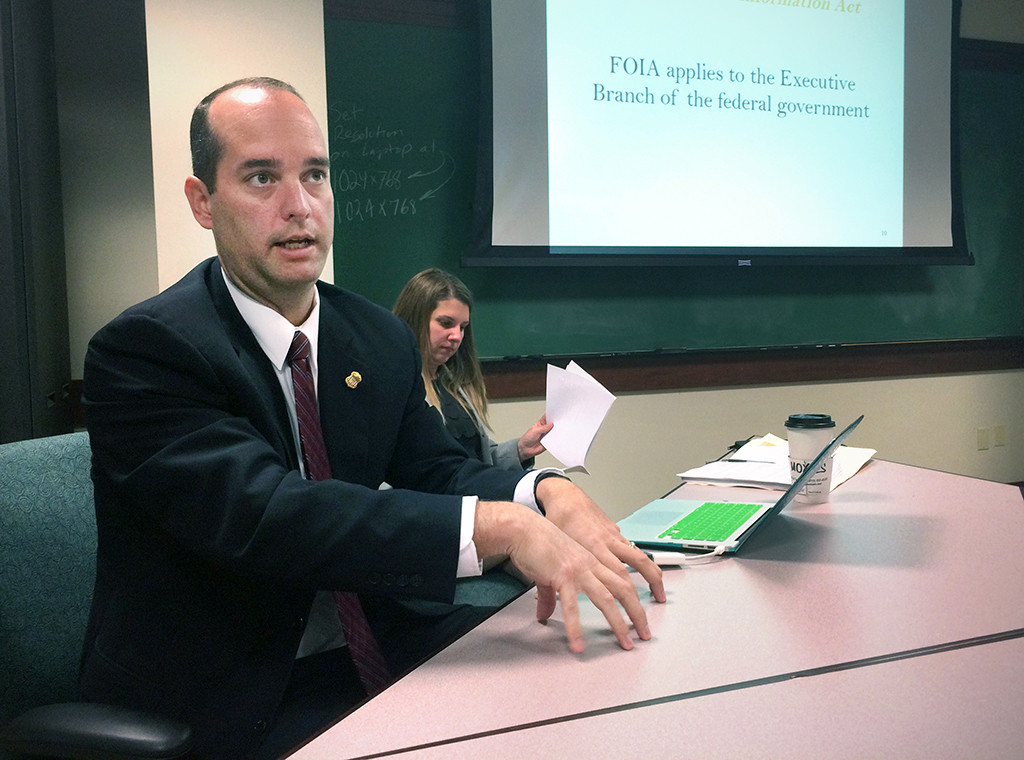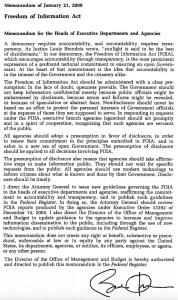
Access to information sometimes takes a nudge, sometimes more
By Bradley Wilson
CMR Managing Editor
Perhaps nothing is more frustrating to a college media adviser or a student working on the college media than being told that they — or their students — can’t have information. Sometimes just a phone call to the appropriate person can resolve the problem but often members of the media have to resort to filing a public information request.
While public university attorneys and other officials — acting on behalf of the state government — sometimes delay and appeal to the state attorney general’s office, sometimes just the request itself can remind public officials that their jobs are supposed to be conducted in a transparent fashion accountable to the public.
When members of the Scholastic Journalism Division of AEJMC met down at the Poynter Institute for Media Studies in January, two federal government officials discussed the Freedom of Information Act.
SPEAKERS
- Sean Flynn, assistant United States attorney and deputy chief of the civil division
- Amy Filjones, law enforcement coordination specialist, public affairs section
U.S. Dept. of Justice
Flynn started off the discussion reviewing the Freedom of Information Act with the members of the AEJMC Scholastic Division at the Poynter Institute.
- “FOIA is a very small part of what we do.” Still, it costs the government a lot of money. There were about 755,000 FOIA requests nationally in 2014. In 2013l, they cost the government about $419.6 million for processing and $27.18 million in litigation-related costs. They recouped $4.3 million from fees assessed.
- FOIA only applies to federal agencies. All states have similar laws.
- Government officials want you to make FOIA requests. Making requests is not a bad thing. “Our current president has directed us to be more forthcoming with requests. We’re encouraged to put as much information out there as possible.”
- “Democracy is better off when the public knows what the government’s doing.”
 Flynn and Filjones also discussed how U.S. President Barack Obama has directed government agencies to make information available.
Flynn and Filjones also discussed how U.S. President Barack Obama has directed government agencies to make information available.
- Flynn said, “We shouldn’t withhold those documents because someone might be embarrassed or someone make a mistake.”
- The president’s memo is available online. He reaffirms that “A democracy requires accountability and accountability requires transparency.”
- And he directs agency officials who are unsure if something should be released or not. “In the face of doubt, openness prevails.”
- Filjones said, “We’re happy to share what we do. It’s not a secret.”
- Memorandum for the heads of executive departments and agencies: Freedom of Information Act from U.S. President Barack Obama
- President Barack Obama’s FOI Memorandum and Attorney General Holder’s FOI Guidelines
The statistics show that government officials are releasing documents. They also show, however, that people are making more FOIA requests.
- 49 percent of documents requested were released in full.
- Flynn said, “Just because there’s an exemption, we shouldn’t withhold the entire document.”
- So, another 42 percent were redacted in some form.
When a citizen makes a request, government officials search where the information is most likely to be.
- FOIA requires that the search for records be adequate and not exhaustive. A legal search might have to be exhaustive.
- Flynn advised individuals making FOIA requests to be as specific as possible when making them especially if they know where the records are located or who has them.
The most challenging requests are the ones that are too broad.
- When FOIA requests go down the wrong path, it’s usually because the request was too broad. The natural instinct is to make a broad request.
- However, Flynn advised people to make the request as narrow as possible to get the information required.
- “We have an interest in getting this information out,” Flynn said. “We’re not doing our job if we’re unduly delaying the release in information.”
- He said if there is a deficiency in the request, the government officials should have a dialog with the person making the request. “It’s supposed to be an interactive request.”
Of course he said, “There are certain things that the government has an obligation to protect.”
- The sister act to the Freedom of Information Act is the Privacy Act.
- There are exemptions to FOIA including national security, personal privacy, privileged communication and law enforcement.
- But routine emails, for example, would not be exempt. “We disclose emails all the time in the Department of Justice.” Even government voice messages are recorded and retained now.
While Flynn said, “We’ve tried very hard to make it more efficient,” one deterrent is the fees including compensation for time to do the searches and duplication costs.
- “Favored” searches — including most news media outlets and educational institutions — only pay for actual duplication costs.
- Often fees can be waived.
- Some requests can be handled without a formal FOIA request. Filjones said, “First start with public information office. If it’s a publicly available document, I’d be glad to just email it.”
- And Flynn said more and more departments just put all their documents online.
MORE RESOURCES
- Department of Justice Guide to the Freedom of Information Act
- Department of Justice Freedom of Information Act Reference Guide
- Freedom of Information Act website
- Student Press Law Center Public Records Letter Generator
- Reporters Committee for Freedom of the Press Open Government Guide
- Society of Professional Journalists Freedom of Information
